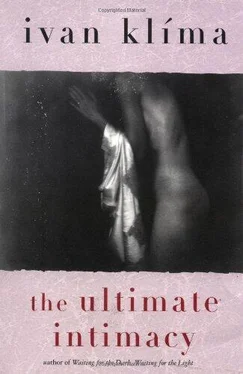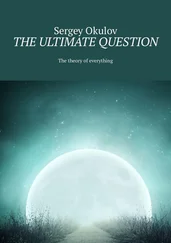Ivan Klima - The Ultimate Intimacy
Здесь есть возможность читать онлайн «Ivan Klima - The Ultimate Intimacy» весь текст электронной книги совершенно бесплатно (целиком полную версию без сокращений). В некоторых случаях можно слушать аудио, скачать через торрент в формате fb2 и присутствует краткое содержание. Год выпуска: 1998, Издательство: Grove Press, Жанр: Современная проза, на английском языке. Описание произведения, (предисловие) а так же отзывы посетителей доступны на портале библиотеки ЛибКат.
- Название:The Ultimate Intimacy
- Автор:
- Издательство:Grove Press
- Жанр:
- Год:1998
- ISBN:нет данных
- Рейтинг книги:3 / 5. Голосов: 1
-
Избранное:Добавить в избранное
- Отзывы:
-
Ваша оценка:
- 60
- 1
- 2
- 3
- 4
- 5
The Ultimate Intimacy: краткое содержание, описание и аннотация
Предлагаем к чтению аннотацию, описание, краткое содержание или предисловие (зависит от того, что написал сам автор книги «The Ultimate Intimacy»). Если вы не нашли необходимую информацию о книге — напишите в комментариях, мы постараемся отыскать её.
The Ultimate Intimacy — читать онлайн бесплатно полную книгу (весь текст) целиком
Ниже представлен текст книги, разбитый по страницам. Система сохранения места последней прочитанной страницы, позволяет с удобством читать онлайн бесплатно книгу «The Ultimate Intimacy», без необходимости каждый раз заново искать на чём Вы остановились. Поставьте закладку, и сможете в любой момент перейти на страницу, на которой закончили чтение.
Интервал:
Закладка:
5
Daniel was to write an article on the theme of Advent. The Bethlehem story had excited him ever since his youth: the Son of God appearing as a needy, even persecuted, human being; God arriving from somewhere other than people expected and not arriving as a bolt of thunder, not descending from the heavens, but being born of a woman — helpless and defenceless, just as we all arrive in the world. By accepting our fate from beginning to end, God made known that He accepted us and loved us, receiving us exactly as He made us, i.e. as His children whose death would grieve him.
Now Daniel sits at his computer and is incapable of finding within himself the requisite certainty of faith in God's birth.
Years ago, he had known a country doctor who had converted from Judaism to Catholicism. He was an outstanding doctor, a man who made a genuine effort to believe. The greatest problem for him was accepting the virgin birth. Perhaps his medical training proved an obstacle. One day he had come running to Daniel with an epic piece of news. He had just read in a specialized American journal that something of the sort was possible, that in one in a trillion cases self-induced
conception could occur and a sort of human clone was produced. That would explain Mary's immaculate conception. Except that, as he himself pointed out, it would entirely eliminate Jesus s divine origin and His identity as the Son of God would only be symbolic, as would His resurrection from the dead in that case. 'Or am I mistaken, Reverend?'
At the time, Daniel had told him that God's actions were one single mystery and it made no sense to try to explain them by some scientific hypothesis or other. That was what he himself believed or strove to believe then. For him, faith had represented a path that led from inhuman conditions towards humanity: Jesus embodied the spirit at a time when matter was invoked on every hand and science was proclaimed as the all-powerful conqueror of truth. Jesus represented love that had to be defended, when hatred was proclaimed as the driving force of history. The language of Scripture had sounded like music amidst the cacophonous caterwauling of the political leaders' speeches from every radio and television set. The hatred showered on Jesus's teaching by those who embodied violence, hypocrisy and treason, and who despised the free or independent spirit, had seemed to confirm the truth of those who then stood by Him — persecuted and mocked as in the early days of Christianity. The world seemed divided between good and evil by a clear and straight boundary.
The boundaries were now crumbling, both within people and outside them. The doubts that Daniel had thrust deep into his subconscious suddenly surfaced. The words that until recently he had solemnly proclaimed — aware of the greatness of the message they carried — now stuck in his throat.
The event at Bethlehem had probably occurred quite differently from the way he had so far expounded it, and therefore its significance was also different. It was mankind who, in their age-old longing to escape the inevitability with which life always ended in death, and in the spirit of the ancient myths and archetypes, had thought up both a royal and a divine origin for the crucified Christ, and devised His birth and hence His divine nature which they then proceeded to debate in subsequent centuries.
In the area in which Jesus lived, worked and was crucified, people had been sacrificing their king for thousands of years in the conviction that he would be resurrected. Before killing him, they used to hang him between heaven and earth. They then ate his body and drank his
blood in order to achieve their own rebirth through his resurrection.
Jesus, above whose cross was said to have been fixed the mocking label 'King of the Jews', died hanging between heaven and earth. His death was to open the gates to the Kingdom of Heaven, which he entered, reborn — or as we say, resurrected. To this very day we symbolically consume his body and blood in order to share in his resurrection.
But anyone who lets such comparisons enter his thoughts risks being accused of one of the age-old or more recent heresies.
How could God create the universe and time and transform Himself into a baby who then grew up and aged until one day, in totally human time, He allowed Himself to be executed by some imperial bureaucrat?
On that occasion, he had not replied to Bára that God is capable of everything. Had he declined to give her that answer because he himself was in doubt, or because it was an answer that could be used to dispose of any question? Or was it perhaps because the order which had governed his life was beginning to crumble?
As usual in the past weeks, his mind somehow strayed to that other woman, the woman who had appeared because the order in his life was beginning to crumble. Or had it started to crumble because she had appeared in his life?
He got up and switched off the computer. He couldn't concentrate anyway. From inside the flat came the strains of the piano. Eva was playing Bach's Prelude and Fugue in G major.
The idea that God who created the universe and time probably did not take upon Himself the form of a Jewish infant was an idea, Bára, defended from the very beginning of the church by the proponents of poor Christology. For them, Christ was simply a prophet, a mere human. And some of the first bishops were excommunicated from the church for those very same doubts about Jesus's divinity. They were outvoted at the councils and thereby became eternal heretics. There were countless heretics: some did not accept Jesus's divinity, others did not recognize the Holy Spirit, the immaculate conception or the assumption of the mother of Jesus. Later there were those who rejected the sale of indulgences and demanded communion of both kinds at the Lord's Supper. At first, the church used to excommunicate them, later it tortured them and turned them over to the secular authorities to be burned alive.
Perhaps it would have taken very little for the dogmas to be completely different, or for the Gospels to be different, for that matter. But the person who defended the present version happened to be more eloquent or had more supporters, and everything turned out the way it is accepted today. Even such transcendental issues as the essence of God or the resurrection were decided by vote.
I have never voiced this opinion to anyone before, Bára. It would be difficult to hold it and go on working as a preacher. And it's going to be difficult if I go on thinking the way I do and living the way I am now.
So I don't know how I'm going to live. No, I'm not thinking about supporting the family; in fact, I wouldn't have to work at all any more, I could simply live from what I made on the sale of the house. It's the meaning of my life that concerns me. What meaning will I give to my last few years on earth? Will I bring some work or project to completion or, on the contrary, abandon everything, cancel it, and stand in no man's land; in other words, at the end of my days will I find myself back at the beginning? And with whom, my love? With you? With my family? Alone? At the end you always stand alone.
That's what Dad always used to say to me: Dan, in death you're always left on your own, whether you believe or not. And he saw lots of people die: during the war in that concentration camp and after the war in prison, and in fact for the entire remainder of his life — being present at death is part of a doctor's job.
Daniel flinched at the memory of his father. He had not finished the job of clearing his name. He had not found out anything; in fact he had stopped searching.
He entered the room without Eva noticing him. He observed her mutely for a moment. His daughter, Jitka's only child. She played faultlessly, her head slightly inclined, her thoughts in heaven.
Читать дальшеИнтервал:
Закладка:
Похожие книги на «The Ultimate Intimacy»
Представляем Вашему вниманию похожие книги на «The Ultimate Intimacy» списком для выбора. Мы отобрали схожую по названию и смыслу литературу в надежде предоставить читателям больше вариантов отыскать новые, интересные, ещё непрочитанные произведения.
Обсуждение, отзывы о книге «The Ultimate Intimacy» и просто собственные мнения читателей. Оставьте ваши комментарии, напишите, что Вы думаете о произведении, его смысле или главных героях. Укажите что конкретно понравилось, а что нет, и почему Вы так считаете.






![Theresa Cheung - The Dream Dictionary from A to Z [Revised edition] - The Ultimate A–Z to Interpret the Secrets of Your Dreams](/books/692092/theresa-cheung-the-dream-dictionary-from-a-to-z-r-thumb.webp)





